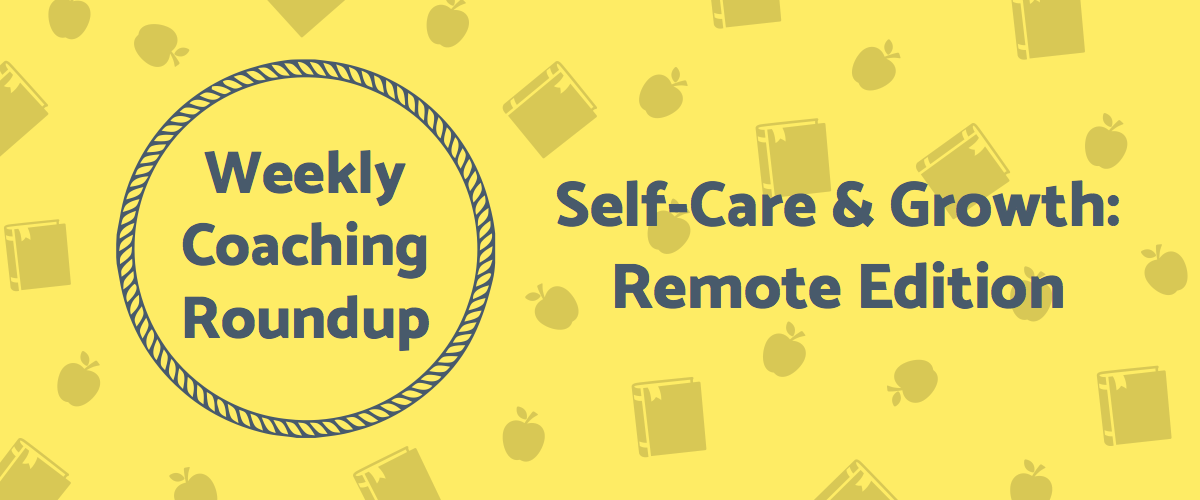


Welcome back to TeachBoost’s Coaching Roundup. This month we’re looking at how you can grow professionally and mentally while working remotely. Take a moment to relax, reflect, and learn from your peers.
4 Key Mindsets for Coaching Remotely
Coaching and leading remotely requires a shift in the way we think and carry out our daily routines. Luckily, Stephanie Affinito was willing to share some of her must-have attributes of ICs working from afar.
”
We are teaching and coaching under such unprecedented circumstances that we have to we get to (not have to!) coach and lead in ways we have never tried before. . . . The lessons we learn each day open up new possibilities for coaching when we return to school, a gift to appreciate as we search for gratitude in these challenging times.”
Rules for Surviving Remote Learning
Pam Hubler provides five ways to stay sane while working from home.
“When I’m home, it’s much harder to keep up with time.
I need my digital reminders so I don’t miss any important meetings! . . . Things are changing so quickly right now, you don’t want to stress yourself out by planning too far ahead and realizing those plans have to change.”
A Healthy Coach
Chrissy Beltran offers three tips to boost yourself mentally when you’re feeling burnt out.
“A big reason you might be feeling stressed and bummed is because we simply spread ourselves too thin as coaches. There are so many things we have to do that being overwhelmed is sometimes just part of the job. . . . As a coach, your plate is full, but
you need to take care of your mental health. A healthy coach is a happy coach after all.”
Self-Care for Instructional Coaches
Megan Purcell has a few approaches for staying calm and productive while overcoming emotional hurdles working remotely.
“Teachers are social creatures – even the introverted ones. We thrive on the ability to connect with our students and coworkers and we yearn to be present during life-changing learning experiences. . . .
Working from home allows you to be flexible and tailor your schedule and your environment to what works best for you individually. If you are struggling with working from home, start with the basics. Create norms, develop a routine and stick to it.”
Give TeachBoost Coach a try for FREE!
TeachBoost Coach supports remote coaching by helping ICs manage their coaching cycles, goals, meetings, and evidence. Additionally, coaches can upload resources and videos to keep everything in one place. Sign up below to try it out!
{{cta(‘33688227-aefb-452f-9cbe-0d1fab8a06af’)}}
A Time for Reflection
Steve Barkley offers a plethora of questions for teachers, coaches, and principals that encourage introspection.
“Instructional coaches and administrators can play an important role in assisting teachers in reflection with questions, paraphrases, and listening that encourage teacher talking. The teacher often needs to hear her voice in order to find insights. In the ‘normal’ school setting teachers often have little time for collegial conversations. . . .
I recommend coaching questions that have teachers describe what is happening or what they are feeling rather than asking them to evaluate, ‘How’s it going?'”
5 Ways to Continue Growing as a Coach
Kristin Van Deman shares a few ways she pursues her own PD and how you can too.
”
One of the most important lessons I’ve learned along the way is the importance of continuing to push yourself, to learn, and to grow. In this pursuit of excellence, you’ll remain engaged in your work and continually motivated to be the kind of coach all teachers need. What this looks like for you may look differently than what it looks like for another coach, depending on your district/school and the support that’s provided. If you’re like me, you may be ‘on your own’ to advocate and pursue your own professional development. But don’t let that scare you—you can do it!”
Educator Stress is a Leadership Challenge
Isobel Stevenson highlights the importance of “system-level” actions to reduce educator fatigue—plus some examples for you to get started.
“Humans are highly motivated to feel competent; knowing that you are good at your job or believing you can meet any challenge is a source of pride and motivation and leads to continued growth. But trying to do too much threatens our sense of feeling competent, which makes us less willing to take risks, which means that we learn less, which further challenges our feelings of competence, and so on. It becomes a vicious circle. . . .
Instead of prioritizing to-do’s, which makes it seem as though some things are less important than others, think about sequencing: Be realistic about everything that needs to be done and arrange in a temporal order.”
3 Qualities to Cultivate When You’re Coaching Remotely
Vicki Collet recommends a few traits that coaches should refine when working remotely.
”
Relational characteristics can make or break a coach’s work, even if all the right procedures and protocols are in place
. This is especially true when coaching remotely. . . . Personal characteristics like empathy, curiosity, humility, and approachability also support your coaching work. In uncertain times, however, traits like courage, consistency, and joyfulness become key to the relational work of coaching.”
Bonus Resources on Growth Mindset
Having a growth mindset, versus a fixed mindset, is a characteristic we can all agree on as a quality everyone should posses. Our friend, Dan Kreiness, shares his experiences of coaching with a growth mindset and how you can combat a fixed mindset with the teachers you work with.
Have some interesting instructional leadership news?
Share it with TeachBoost and we’ll highlight it here!
Stay Connected
News, articles, and tips for meeting your district’s goals—delivered to your inbox.








